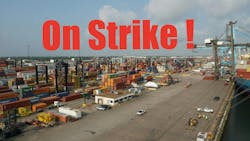East Coast Port Strike Halts 90% of U.S. Chemical Shipments
Chemical Processing's parent company, Endeavor Business Media, has several publications dealing with the impact of the dockworker strike. For more coverage of the work stoppage:
- US Dockworkers Launch Strike After Labor Contract Expires, IndustryWeek notes despite the bleak outlook, some experts have hope that the U.S. can avoid a major blow to the supply chain and economy.
- Dockworker Strike Could Impact Supply Chains, Supply Chain Connect looks into the potential impact of the strike in a story posted before dockworkers walked out.
- Supply Chain Experts Weigh in on Potential International Longshoreman’s Association Strike, Healthcare Purchasing News Editor-in-Chief Janette Wider looks into how medical and pharmaceutical industries are dealing with the work stoppage.
- Implications of Potential Port Strike: Updated, Material Handling & Logistics Senior Editor Adrienne Selko has updated as story from last week about the strike's potential with fresh commentary from supply chain experts.
- Reactions, Economic Analysis of Port Strike, Material Handling & Logistics Senior Editor Adrienne Selko's latest story updates her previous coverage with expert commentary.
- Tire Imports Could Be Impacted by Strike, Modern Tire Dealer editor Mike Manges looks into how the strike could impact the tire industry.
Failing to reach an agreement before Sept. 30, the International Longshoremen’s Association and the United States Maritime Alliance took to the picket line Oct. 1, marking their first large-scale stoppage in nearly 50 years. This action has halted operations at 36 ports from Maine to Texas, affecting approximately half of the nation's ocean shipping.
For the chemical industry, this strike presents substantial challenges. The movement of raw materials, chemicals and finished products through these ports is now blocked, potentially causing production delays and shortages. According to the American Chemistry Council (ACC), about 138 million tons of chemicals were transported through the ports in the Gulf Coast, and about 31 million tons of chemicals were transported through the East Coast ports in 2022. These chemical shipments were worth over $100 billion.
“The chemical industry is one of the country’s largest shippers across all modes of transportation, including marine shipments through our nation’s ports,” said Chris Jahn, president and CEO of the ACC, in a statement regarding the strike. “The ports impacted by the strike account for about 90% of the waterborne chemical shipments that move in and out of the U.S.
“Shutting down the ports along the East and Gulf Coasts will result in a major disruption of chemical imports and exports, which in turn will hurt the broader economy both here and abroad. We urge the White House to do everything possible to prevent this major shockwave from rippling through the American supply chain and hurting U.S. trade by working with both parties to resume contract negations.”
Echoing the ACC’s statement, Alliance for Chemical Distribution (ACD) President and CEO Eric R. Byer said, “The ocean shipping market is already in disarray, and this strike will result in severe delays, reroutes and greater uncertainties on the delivery of essential products at countless U.S. ports. ACD urges the Biden administration to swiftly intervene to resolve this strike by reopening the ports and getting both sides to reach an agreement to prevent further supply chain disruptions and avoid significant economic consequences.”
During an 11-day strike on the West Coast in 2002, the reported economic impact was $1 billion per day, and it took six months to recover.
The Biden administration is under pressure to intervene using the Taft-Hartley Act, which would allow a cooling-off period, but it has so far urged both sides to reach an agreement independently.
Top Ports - Total Chemicals Traffic
- Houston
- Port of South Louisiana
- New Orleans
- Port of Greater Baton Rouge
- New York/New Jersey
Top Ports for Chemicals Imports
- Houston
- New York
- Port of South Louisiana
- New Orleans
- Savannah
Top Ports for Chemicals Exports
- Houston
- Port of Greater Baton Rouge
- New Orleans
- Freeport
- Corpus Christi
Source: American Chemistry Council
About the Author
Traci Purdum
Editor-in-Chief
Traci Purdum, an award-winning business journalist with extensive experience covering manufacturing and management issues, is a graduate of the Kent State University School of Journalism and Mass Communication, Kent, Ohio, and an alumnus of the Wharton Seminar for Business Journalists, Wharton School of Business, University of Pennsylvania, Philadelphia.

